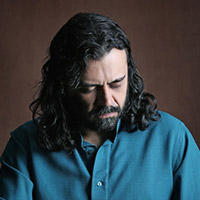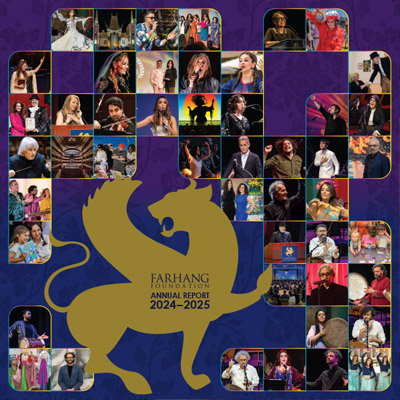A TOUR OF IRAN - Symphony Concert and Cultural Festival

Farhang Foundation and New West Symphony present
Global Sounds. Local Cultures.
A Tour of Iran
Symphony Concert
The concert explores centuries-old traditions of Iranian poetic and musical cultural influences on the western world.

Music Director Michael Christie

Sasha Cooke

Melieka Fathi

Pejman Hadadi

Admad Karimi-Hakkak

Masoud Rezaei

Hamid Saeidi
Award-winning mezzo-soprano Sasha Cooke and Iranian instrumentalists Pejman Hadadi and Masoud Rezaei join the New West Symphony on this musical voyage.
GRAMMY-winning Artistic and Music Director Michael Christie leads the orchestra in western classical masterworks by Handel, Rameau, Gounod, and the timeless overture to Mozart’s Magic Flute.
Iranian composers Behzad Ranjbaran, Masoud Rezaei and Golfam Khayam share their inspiration from Iranian sites and poetry.
MICHAEL CHRISTIE, CONDUCTOR
SASHA COOKE, Mezzo Soprano
PEJMAN HADADI, Tombak and Daf
MASOUD REZAEI, Setar
KHAYAM: Seven Valleys of Love for Strings (Simorgh, Murmuration)
MOZART: Magic Flute Overture
RANJBARAN: Enchanted Garden: Joy
RAMEAU: Suite from Zoroastre
HANDEL: Xerxes: “Ombra mai fu”
GOUNOD: from the Opera “Faust”
Entr’Acte | Faites lui mes aveux (Flower Song) |Si le bonheur (When fortune beckons)
REZAEI: From the album “Nothingness”
“Another Birth” | “Cold Autumn” | “Failure”
Reception with Michael Christie and guest artists will follow immediately after the concert.
ARTIST BIOS
Music Director Michael Christie
Grammy award-winning conductor Michael Christie is a thoughtfully innovative conductor, equally at home in the symphonic and opera worlds, who is focused on making the audience experience his performances entertaining, enlightening, and enriching. The New York Times reports, “Michael Christie is a director open to adventure and challenge,” and the Cincinnati Enquirer declares, “If Michael Christie represents the future of music in this country, the future looks promising indeed.”
Christie won a 2019 Grammy Award (Best Opera Recording) for the world premiere recording of Mason Bates’ The (R)evolution of Steve Jobs with The Santa Fe Opera (PENTATONE). In 2017, he led the world premiere performances at The Santa Fe Opera, “with suave assurance” (San Francisco Chronicle), with “precision and pizzazz” (Santa Fe New Mexican), and “preside[d] over an expertly executed performance” (The Financial Times).
Michael Christie was featured in Opera News in August 2012 as one of 25 people believed to “break out and become major forces in the field in the coming decade.” At Minnesota Opera, Christie led 24 productions over eight years, six seasons as its first-ever Music Director (2012-2018) – from staples of the repertory such as La Traviata, Nabucco, Macbeth, La Boheme, Fanciulla del West, Arabella, and Das Rheingold to performances of 20th and 21st-century operas via Minnesota Opera’s New Works Initiative, including Bernard Herrmann’s only opera Wuthering Heights, the world premiere of Kevin Puts’ Silent Night which won the Pulitzer Prize in 2012, the world premiere of Kevin Puts’ The Manchurian Candidate, and the world premiere of Paul Moravec’s The Shining.
In the 2019-2020 season, Christie leads performances of Mason Bates’ The (R)evolution of Steve Jobs with San Francisco Opera; Mozart’s The Abduction from the Seraglio with Lyric Opera of Kansas City; and Puccini’s Suor Angelica and Gianni Schicci with Indiana University Opera and Ballet Theater.
Deeply committed to bringing new works to life, Michael Christie has championed commissions by leading and emerging composers alike, including Mark Adamo, Mason Bates, Michael Daugherty, Osvaldo Golijov, Mark Grey, Daron Hagen, Huang Ruo, Matthew Hindson, Marjan Mozetich, Stephen Paulus, Kevin Puts, and more. In 2018, he led the world premiere of An American Soldier, a two-act opera by Huang Ruo, with Opera Theatre of St. Louis “with impressive precision,” as praised by Dallas Morning News. The New York Times reported, “Both the subtle colorings and pummeling intensity came through in the compelling performance the conductor Michael Christie drew from the St. Louis Symphony Orchestra.”
Other recent highlights include Christie’s San Francisco Opera debut in the world premiere performances of Mark Adamo’s The Gospel of Mary Magdalene and the world premiere of Twenty-Seven, a new opera by Ricky Ian Gordon commissioned by Opera Theatre of St. Louis. Notable past performances include highly praised productions of Corigliano’s The Ghosts of Versailles and John Adams’s The Death of Klinghoffer, and the North American premiere of Unsuk Chin’s Alice in Wonderland, all with Opera Theatre of St. Louis; the European premieres of The Ghosts of Versailles at the Wexford Festival Opera; as well as various performances at Opernhaus Zürich, Finnish National Opera, Scottish Opera, and Lyric Opera of Chicago. In addition to premiering Kevin Puts’ Silent Night with Minnesota Opera, he also led performances by Opera Company of Philadelphia, Wexford Festival Opera in Ireland, and Opéra de Montréal.
Christie’s conducting career, spanning more than 20 years, has included serving as Music Director of the Phoenix Symphony (2005-2013) and Brooklyn Philharmonic (2005-2010), and as Chief Conductor of the Queensland Orchestra (2001-2004) in Australia, as well as guest appearances leading the Los Angeles Philharmonic, National Symphony Orchestra, Civic Orchestra of Chicago, Rochester Philharmonic Orchestra, Rhode Island Philharmonic, and the Symphonies of Dallas, St. Louis, Atlanta, Houston, Minnesota, Oregon, Indianapolis, Cincinnati, and Santa Rosa.
Christie’s many European engagements have included leading the Rotterdam Philharmonic, DSO Berlin, Orchestre National de Lille, Swedish and Netherlands Radio Symphony, City of Birmingham Symphony, NDR Hannover Orchestra and the Czech Philharmonic. In addition, Christie enjoys a strong profile in Australia, where he has conducted the Sydney Symphony, Tasmanian Symphony, Opera Queensland, and the Western Australian Symphony in Perth.
Christie’s New York Philharmonic debut came in 2007 when he stepped in on short notice for an ailing Riccardo Muti, and his Carnegie Hall debut came in 2014 when he led the Rochester Philharmonic Orchestra as part of the Spring for Music festival. Christie also served as the Music Director of the Colorado Music Festival from 2000-2013, where he was highly praised for his innovative programming and where audiences are now at an all-time high, resulting in him being named “Musician of the Year” by The Denver Post in 2010.
Michael Christie first came to international attention in 1995 when he was awarded a special prize for “Outstanding Potential” at the First International Sibelius Conductors’ Competition in Helsinki. Following the competition, he was invited to become an apprentice conductor with the Chicago Symphony Orchestra where he subsequently worked with Daniel Barenboim as well as at the Berlin State Opera during the 1996-1997 season. Christie graduated from the Oberlin College Conservatory of Music with a bachelor’s degree in trumpet performance. Christie lives in the Twin Cities with his wife, Alexis, a physician, and their two children.
Sasha Cooke
Two-time Grammy Award-winning mezzo-soprano Sasha Cooke has been called a “luminous standout” ( New York Times ) and “equal parts poise, radiance and elegant directness” ( Opera News ). She is sought after by the world’s leading orchestras, opera companies, and chamber music ensembles for her versatile repertoire. A devoted interpreter of new music, she has premiered works by composers Mark Adamo, Mason Bates, William Bolcom, Jake Heggie, Pierre Jalbert, Laura Kaminsky, Lowell Liebermann, Nico Muhly, John Musto, Marc Neikrug, Kevin Puts, Augusta Read Thomas and Joby Talbot. Ms. Cooke has sung at the Metropolitan Opera, San Francisco Opera, English National Opera, Seattle Opera, Opéra National de Bordeaux, and Gran Teatre del Liceu, among others, and with over 70 symphony orchestras worldwide frequently in the works of Mahler under leading conductors including Yannick Nézet-Séguin, Gustavo Dudamel, Bernard Haitink, James Levine, Edo de Waart, Trevor Pinnock, Harry Bicket, Michael Tilson Thomas, Riccardo Muti and Sir Mark Elder.
During the 2020-21 season Ms. Cooke returns to the San Francisco Opera for Poul Ruders' A Handmaid's Tale and performs the world premiere of Joby Talbot's The Diving Bell and the Butterfly at Dallas Opera. On the concert stage, she reunites with the Radio Filharmonisch Orkest for Das Lied von der Erde at The Royal Concertgebouw, sings Mahler’s Symphony No. 3 with the Minnesota Orchestra, performs Rilke Songs with composer and conductor Michael Tilson Thomas with the Los Angeles Philharmonic and returns to the Houston Symphony for Beethoven. Alongside soprano Susanna Phillips, she makes recital debuts in Baltimore, Portland and University of Illinois at Urbana-Champaign.
As a dedicated recitalist, Ms. Cooke was presented by Young Concert Artists in her widely acclaimed New York and Washington debuts at Carnegie’s Zankel Hall and the Kennedy Center. She has also appeared in recital at Alice Tully Hall, The Wigmore Hall, the Kennedy Center and the 92nd St Y. Her recordings can be found on the Hyperion, BIS, Chandos, Naxos, Bridge Records, Yarlung, GPR Records and Sono Luminus labels. Most recently she appears on five recordings including L'enfance du Christ with Sir Andrew Davis and the Melbourne Symphony on Chandos, Bates' The (R)evolution of Steve Jobs on Pentatone which won the 2019 Grammy Award for Best Opera Recording, Mahler’s 2nd Symphony with Osmo Vänskä and the Minnesota Orchestra on BIS, Berlioz’s Roméo et Juliette with Michael Tilson Thomas and the San Francisco Symphony and Sasha Cooke LIVE a collection of her performances from the Music@Menlo chamber music festival released on their label.
A graduate of Rice University and The Juilliard School, Sasha Cooke also attended the Music Academy of the West, the Aspen Music Festival, the Ravinia Festival’s Steans Music Institute, the Wolf Trap Foundation, the Marlboro Music Festival, the Metropolitan Opera’s Lindemann Young Artist Development Program, and Seattle Opera and Central City Opera’s Young Artist Training Programs. Ms. Cooke has given masterclasses throughout the United States and Canada. She lives near Houston, TX with daughters Evelyn and Julia and husband baritone Kelly Markgraf.
Pejman Hadadi
World-renowned, Pejman Hadadi is considered one of the most innovative Iranian percussionists. He was born in Tehran, Iran on February 19, 1969. At the age of 10, he began studying Tombak, the central drum in traditional Persian music with Master Tombak player, Assadollah Hejazi for 2 years and owes the foundation of his training to this Master’s precise teaching. He continued his training for a brief time with Master Tombak player, Bahman Rajabi who exposed him to an entirely different approach to playing the instrument. Pejman tirelessly followed the various styles of famous Tombak players and was captivated by such great Masters as Hossein Tehrani, Nasser Farhangfar, and Morteza Ayan who influenced him greatly through their recordings. After some time, he felt drawn to the other main percussive instrument in the tradition, namely the sacred frame drum known as the Daf. Alongside his long hours of Tombak practice, he taught himself how to play the Daf, finding great inspiration from the great Master Daf player, Bijan Kamkar through his recordings.
Pejman immigrated to the US in 1989 and began his professional career in 1991. After collaborating with a few different music ensembles Oshagh and Nava, he began performing with Master musician and composer, Hossein Alizadeh in serval concerts in the US which led him to pursue music with more diligence. In 1995, he joined Dastan Ensemble, the highly celebrated and “most-forward-looking Persian music ensemble” (LA Weekly). Pejman has recorded countless critically acclaimed pioneering works with Dastan and continues to perform with the ensemble in some of the world’s most noted concert halls.
In the year 2000, along with Behnam Samani, Reza Samani, Hakim Ludin, Javid Afsari Rad, and Morshed Mehregan he revolutionized the first Iranian percussion ensemble, ZARBANG with whom he has performed extensively in major international festivals and prestigious concert halls in Europe, North America and Hong Kong. His ground-breaking recordings with this ensemble include Rengineh, Middle Eastern and World Percussion, and Call to Love.
Concurrent with his activities with Dastan Ensemble and ZARBANG, Pejman began performing and recording with a variety of musicians, both Iranian and from other cultures. The impressive list of these musicians includes Hossein Alizadeh, Shahram Nazeri, Homayoun Shajarian, Kayhon Kalhor, Parissa, Shujaat Hussain Khan, Omar Faruk Tekbilek, Hossein Omoumi, Sima Bina, Salar Aghili, Ali Akbar Moradi, Hafez Nazeri, Ardeshir Kamkar, Matthaious Tsahourides, Nejati Celik, Halil Karadoumon, Yair Dalal, Imamyar Hasanov, Rajeeb Chakraborti, Adam Rudolph, Brad Dutz, Gregg Ellis and Yuval Ron among others.
These collaborations, specifically the ones with non-Iranian musicians inspired him to explore and research the world of rhythm in different cultures especially those of the neighboring countries to Iran. Being distinctively drawn to the body of rhythm in India, he began to study the Tabla for 2 years with the aim of understanding cyclic rhythms. Learning the technique of Tabla and its different rhythmic patterns significantly influenced his methodology and attitude towards playing the Tombak.
Considered one of the most notable Iranian Tombak players, Pejman has created a distinct signature style that has greatly impacted Tombak players of his own generation and after. One of his innovations is adding a piece of skin onto the frame of the Tombak with the aim of creating variety, color, and a specific sonic atmosphere. Another one of his innovations is a new version of custom-made tunable frame drums called Pezhvāk or Davaayer-e Kooki. These drums come in various sizes in order to create harmonic intervals based on the sound of percussion in traditional Persian music. Designed to be assembled on specific stands, these frame drums can be set up to be played simultaneously and with other appropriate percussive instruments like the Tombak, which adds a greater dimension to the sound and color of ensemble music. Pejman used this combination for the first time in his concerts with Dastan Ensemble and their album Shurideh. Pejman’s combination is now enjoying a wide reach and popularity among the new generation of percussive artists.
Notable among Pejman’s achievements is his collaboration with REMO, one of the largest manufacturers of synthetic skin and percussive instruments in the world. After years of experimentation, Pejman succeeded in finding access to a certain kind of synthetic skin which when placed on the frame of the Daf yielded an agreeable, authentic sound. Since his success in 2009, REMO began manufacturing the Daf with a very appealing design and quality which has spread the popularity of the Daf among percussionists all over the world.
For years, concurrent with his performing career, Pejman has been very active in teaching and educating people in the arena of rhythm and percussion. He has numerous instruction manuals that await publication. He received the prestigious Durfee Foundation Master Musician Award twice for dissemination and propagation of Persian music in the US. In 1999, he founded Neyreez World Music Institute in Southern California where for years he taught classes alongside other notable musicians.
Since 1999 Pejman has composed a large body of music for dance which he has performed extensively in concert with renowned dancer and choreographer, Banafsheh Sayyad and her ensemble, NAMAH in Europe and North America, marking the first time Contemporary Persian dance and music were brought onto the stage.
Pejman has also been active in film music. His recordings include Prince of Egypt and Prince of Persia. He was commissioned by the Los Angeles Master Chorale and performed at Disney Hall with the Choral in 2007.
He is currently a visiting professor at UCLA at the Department of Ethnomusicology.
Masoud Rezaei
Masoud Rezaei is an Iranian award-winning composer/ Setar (Persian Lute) player based in Los Angeles, CA.
He was born in 1986 in Iran. Masoud Started learning the Setar at the age of eleven, later he continued his education and got his B.A in "Iranian Traditional Music Performance". He had the privilege of being taught by Masters : Zolfonoun, Babaei and Shoari for many years. He started to experience a personal musical journey and the result was released on 2015 as an album "Nothingness" and a piece of this album was nominated for the best world music in HMMA in 2018. In this album he worked with renowned musicians like Master Navid Afghah, Tony Overwater, Shahram Gholami and Kiarash Etemadseifi. Masoud released his second album “Until” (which is the reflection of very hard days when he was under a lot of pressure for protesting during the Green Movement and its consequences such as imprisonment and other punishments by the government of Iran) in May 2019 featuring renowned musician “Mohsen Namjoo”. "Until" won the 18th "Independent Music Awards" in "Best World Traditional album" and also Global Music Awards" in World Music and Album categories.
He has performed many concerts with great musicians in Iran and US
Hamid Saeidi
Hamid Saeidi is an Iranian composer, musician, and member of Opium Moon, a award-winning multinational superstar quartet that creates instrumental improvisations and songs combining Iranian classical music with an Eastern spirit. In 2019, they won the Grammy Award for Best New Age Album for their eponymously named "Opium Moon." Opium Moon is the perfect realization of a music that cannot be pigeonholed, debuting on four separate Billboard charts, including Heatseekers, Classical, Classical Crossover and World Music. As one Amazon.com admirer put it, "This is World Music from another world."
Trained in the Radiff system of Persian classical music from the age of 15, Saeidi studied santoor (Persian hammered dulcimer) with famed master Madjid Kiani. He went on to pursue a degree in music from The Iranian Academy of the Arts where he studied composition under masters Farhad Fakhredini and Vartan Sahakian.
Saeidi's amazing technique, emotional depth and innovative improvisations have earned him international acclaim for performances in Iran, Greece, Ireland, Germany, England, Turkey, Canada, Malaysia and the United States. Over his career, he has composed musical scores for more than 35 films, television programs, dance and theatrical presentations, including "Baran Dar Aftab" by Farshad Fereshteh Hekmat, "Javdanegi" by Farshad Fereshtehekmat, "Afsaneh Saheleh Tareek" by Reza Davari, "Letters from Tentland" by Helena Waldman and the dance presentation, "Avazhick," at the celebrated Theatre Shahr in Tehran. His work received awards at the Beirut film festival (2002), the Iran TV Festival (2002-2004-2007) and the Society of Critics of Theater in Iran (2005). In recognition of his accomplishments on the international stage, The Farhang Foundation in Los Angeles commissioned original multimedia compositions by Hamid in 2010 Imaginary Knots and in 2012 for their annual Nowruz celebration of Persian culture at the Los Angeles County Museum of Art.
END FAQ







